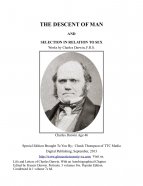Darwin turned wholeheartedly to the problem of evolution. Ever since his Beagle trip he had been convinced that the difference between what naturalists called 'varieties' and what they called 'species' was much less significant than previously thought. If pigeon breeders could create varieties as different as pouters, runts, and fantails, what would prevent nature from doing the same? And, given millions of years, wasn't it possible that a pigeon could be turned into something so radically different we would no longer be willing to call it a pigeon–or even a bird?
Darwin was not the first to have these kinds of thoughts. Seventy years before, his grandfather, Erasmus, had devoted a whole section of his book Zoonomia to the issue of evolution. In 1844, Robert Chambers anonymously published his controversial book, The Vestiges of the Natural History of Creation, a sweeping history of the cosmos that came down strongly on the side of evolution, largely on the evidence of fossils (the 'vestiges' of creation). The book was flawed, but popular, and it brought the idea of evolution into the public eye. The opposition to evolution was still strong, but it included among its number a wide range of opinions, from those who thought that all species had been created at the beginning of the world in the same form as they now had, to those who thought that new species were being continuously created to fill new environmental niches, to those who thought that variation within species was within Nature's power but the creation of new species remained in God's hands.
Darwin had two things to contribute to this debate: a wealth of observations on adaptation, and, more importantly, a theory that could explain how new adaptations arose without the guiding hand of a divine Creator. His observations were gained by his own experience on the Beagle, his eight painstaking years of work on barnacles, and the advice and expertise of friends like Hooker. His theory was his own creation. Darwin solved the problem of evolution by pointing to a mechanism that depended on nothing but variation and chance: natural selection. Many more individuals were born than could be supported by the environment, which meant that some had to die. Which ones died? Obviously, those that were least well adapted to the environment. Given that there is variation in the population, and that that variation is heritable (i.e. can be passed from one generation to the next), it was clear that the most useful adaptations would be preserved. If enough of those adaptations were accumulated, a new species could arise.









